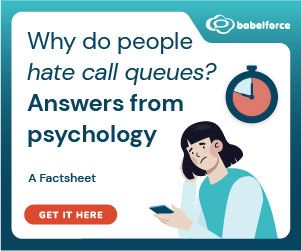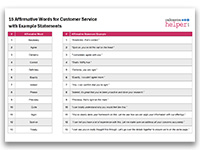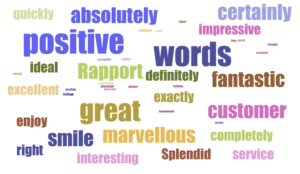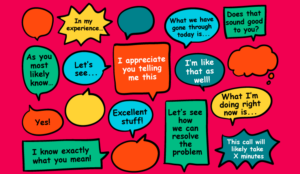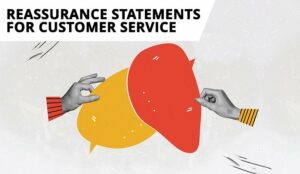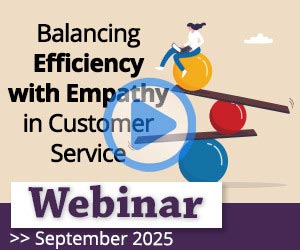Effective communication is at the heart of every great customer interaction. One simple yet powerful way to create positive conversations is by using affirmative words and statements.
These expressions help advisors acknowledge customers’ concerns, reinforce understanding, and build rapport. In this article, we share examples of affirmative words and sentences that can improve contact centre conversations in this article.
What Are Affirmative Words and Statements?
Affirmative words and sentences are used to show agreement with another person, in a supportive, encouraging and hopeful manner.
When receiving an affirmative response, customers feel validated and buoyed by the advisor’s enthusiasm and positivity.
Of course, tone of voice plays a big part in evoking this reaction. So, when paired with classic advice – such as “smile as you dial” – affirmative words and sentences can be powerful tools in building rapport with customers.
15 Examples of Affirmative Words to Build Positivity
“Yes”. This is the definitive affirmative word. It confirms that the customer is correct in what they’re saying and helps to show them that everyone is on the same side.
Yet it is not the only affirmative word. Here’s a list of 15 examples that can add great value to contact centre conversations.
- Absolutely
- Agree
- Certainly
- Correct
- Definitely
- Exactly
- Indeed
- Please
- Precisely
- Quite
- Right
- Spot-on
- Totally
- True
- Yes
Noticeably, many of the affirmative words within this list end in “ly”. “Absolutely”, “definitely” and “exactly” are just three examples. These words can make a particularly positive impression on the receiver.
Not sure? Well, consider FedEx’s slogan: “When it absolutely, positively has to be there overnight.” Then, there’s United Airlines’ slogan: “Fly the friendly skies.” The use of “ly” is no coincidence.
One exception to this rule, however, is the word “obviously”. It can come across as condescending, according to Nina Goldsworthy-Griffiths, Founder of Ignite Organisational Development.
“What seems obvious to an advisor may not be to a customer. So, using the word ‘obviously’ can evoke a negative response,” says Nina.
So, it may be best to avoid this one, as well as other examples, such as “of course”, “naturally” and “clearly”, for the same reason.
Discover lots more examples of words and phrases to avoid when talking to customers in our article: 15 Things a Call Centre Agent Should Never Say (But Many Do)
The Top 10 Examples of Affirmative Statements
Taking the affirmative words from the list above, here are ten great examples of affirmative statements to use with customers.
- “Absolutely, that’s correct.”
- “Spot on, you’ve hit the nail on the head.”
- “I completely agree with you.”
- “That’s 100% true.”
- “Certainly, you are right.”
- “Exactly, I couldn’t agree more.”
- “Yes, I can confirm that you’re right.”
- “Indeed, it’s great that you’ve been proactive and done your research.”
- “Precisely, that’s right on the mark.”
- “I can totally understand why you would feel like this.”
The final statement is especially interesting, as it highlights how affirmative sentences can also be used to validate customer emotions.
In saying that they “totally understand”, the advisor emphasizes that the customer’s emotional reaction is warranted. This facilitates a harmonious phone call and is great for dealing with angry customers.
For the most part, however, the affirmative sentences above are best used with customers who wish to clarify their understanding. Simply saying “Absolutely, that’s correct” fits the bill, while it also breeds positivity.
Yet, every now and then, advisors will come across a “know-it-all” customer…
Affirmative Statements to Deal With a Know-It-All
Know-it-all customers will constantly interject by referencing an internet search or a friend’s experience to try and prove the advisor wrong.
When handling these tricky customer conversations, affirmative sentences can once again be well employed. Agree with them and use a statement such as number eight on the list above: “Indeed, it’s great that you’ve been proactive and done your research.”
Such a sentence can be very useful, as these customers are crying out for a compliment, so give it to them. If they persist, encourage advisors to position their insights as “insider information”. They are the true experts in this conversation after all.
5 Examples to Deal With a Know-It-All Customer
- “You’ve clearly done your homework on this. Let me see how we can align your information with our offerings.”
- “I can tell you have a lot of experience with this. Let me make sure we address all your concerns accurately.”
- “I can see you’ve really thought this through. Let’s go over the details together to ensure we’re on the same page.”
- “You’re clearly very informed about this. I’m here to help make sure we provide exactly what you’re looking for.”
- “You’ve raised some excellent points. Let’s address each one to ensure you’re completely satisfied.”
To find out how to deliver the perfect customer compliment, read our article: 50 Great Complimentary Words to Use in Customer Service
Printable – 15 Affirmative Words for Customer Service
with Example Statements
Do you want to download this to share with your team?
Get your free download of 15 Affirmative Words for Customer Service with Example Statements now:
Training Advisors to Use Affirmative Words and Sentences
Affirmative words and sentences inject energy into customer conversations. Advisors can, however, feel uncomfortable when using upbeat words, for fear of seeming inauthentic.
So, start by reminding advisors that a customer has never before – in the history of contact centres – complained that an advisor was too positive (probably!).
Then, roleplay scenarios. Test the team to build positive words into their responses and present opportunities to use the affirmative sentences above.
“Roleplays offer a safe space for advisors to try out new techniques, without fear,” says Nina. “They help build an advisor’s confidence, which then creates customer trust.”
Track the progress of advisors with a quality monitoring initiative. If advisors are still hesitant to use affirmative language, play them call recordings and highlight just how much of a positive influence it can have on interactions.
Finally, lead by example. When an advisor looks to clarify information with a team leader, ask them to respond affirmatively.
To take this further, when an advisor asks their leader a question, encourage the leader to challenge advisors to come up with their own solution. Simply say: “Interesting question, what do you think?”
Not only will this develop advisor autonomy and free up leader time in the long run, but when the advisor proposes a solution, an affirmative sentence can be used. “Absolutely, that’s a great idea” is an excellent example.
In doing so, as well as bringing energy, enthusiasm and positivity to the job, leaders are setting a standard that advisors will naturally follow.
Active listening also plays a key role in ensuring that advisors seize the opportunities to use affirmative words. To train this invaluable skill, read our article: How to Train Active Listening in the Contact Centre – With Four Exercises
Terrific Tips for Being Affirmative
To further promote the use of affirmative words and phrases within the contact centre, here are three further secrets to success.
Stay in the Moment
Coach advisors to listen well and stay in the moment, so when a chance to use affirmative words and sentences arises, they seize the opportunity.
To help advisors do so, encourage them to:
- Eliminate distractions
- Avoid pre-empting
- Make notes
- Ask probing questions to clarify
- Recap key facts
However, keep in mind that the ability to stay in the moment also hinges on an advisor’s positive mindset. Such a mentality can be tricky to maintain over long shifts.
So, coach leaders to have “trigger conversations” with the team. These remind advisors that what may seem like just another call to them is potentially a serious and significant issue for the customer.
Find out more about trigger conversations in our article: 10 Great Conversations to Have With Your Contact Centre Team
Tone of Voice, Pacing and Leading
Tone of voice is critical to bolster affirmative statements with infectious positivity. To get this right, classic pieces of advice, such as “smile as you dial” and sitting up straight can work wonders – as can pacing and leading.
“Match, pace and lead,” says Nina. “Considering the customer’s speech rate and rhythm, advisors can respond in a way that matches the customer’s sense of urgency.”
With this display of commonality, advisors subtly signal to the customer that they’re on their side and share their desire to get the matter resolved. This “unspoken” agreement is a great example of affirmation.
Once this base level of rapport is established, advisors can then take control of the conversation by leading the way.
Be careful with mirroring in general, however, especially when reflecting back the customer’s words. There is a fine line between mirroring and mimicking.
Discover how to successfully use mirroring and other rapport-building techniques in our article: 27 Effective Ways to Build Customer Rapport
Develop Self-Awareness
If advisors feel uncomfortable with being affirmative, encourage self-reflection. What’s stopping them from using powerful, affirmative words? Help them to uncover the reason.
Open up a conversation. Tell them that they’re very capable of getting this right and stress the power of a positive mindset. Then build self-awareness, so advisors begin to self-manage their emotions and become aware when their mind slips from the task at hand.
To do this, emotional intelligence expert Sandra Thompson recommends that contact centres “Ask advisors to spend a couple of minutes, every day, writing a journal and encourage them to look for patterns in what they write.”
Build Self-Awareness
- Reflecting, as a team, on positive and negative calls and highlighting how mindset played a good and bad part.
- Thinking about how individual performance statistics change throughout the day. Are there trends? If so, consider causes.
- Running personality and psychometric tests.
However, the step before this may include helping advisors to appreciate how their mood influences performance.
Give them a handful of useful affirmative phrases to add to their arsenal. Read them out loud, once enthusiastically and once robotically. This helps to demonstrate the power of a positive mindset.
Find out how to unleash the self-awareness within your team by reading our article: Emotional Intelligence FAQs Answered by an Expert
Affirmative Responses
Affirmative responses are used to show agreement with customers, injecting positive energy into contact centre conversations.
Positive advisors will more naturally use affirmative phrases and engage in better customer conversations.
Showing agreement is useful to demonstrate that everybody is on the same side. However, advisors don’t only have to agree to a customer’s words, they can also let upset customers know that negative emotions are warranted. This helps to back up empathy.
To coach advisors to use affirmative words and sentences well, showcase how effective they are through roleplay. Also, use call recordings, train tone of voice and lead by example.
One final – albeit broader tip – is to focus on creating a great culture. Positive advisors will more naturally use affirmative responses and engage in better customer conversations.
If you want more tips and tricks to improve the language of your contact centre, read these articles next:
- 27 Positive Statements to Use in Difficult Situations
- The Best Power Words and Phrases to Use in Customer Service
- The Top 10 Reassurance Statements for Customer Service
Author: Charlie Mitchell
Reviewed by: Hannah Swankie
Published On: 14th Feb 2022 - Last modified: 14th Aug 2025
Read more about - Skills, Call Handling, Free Downloads, Language, Positive Words, Rapport, Skill Development, Soft Skills, Training and Coaching




